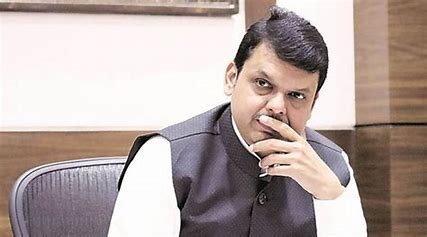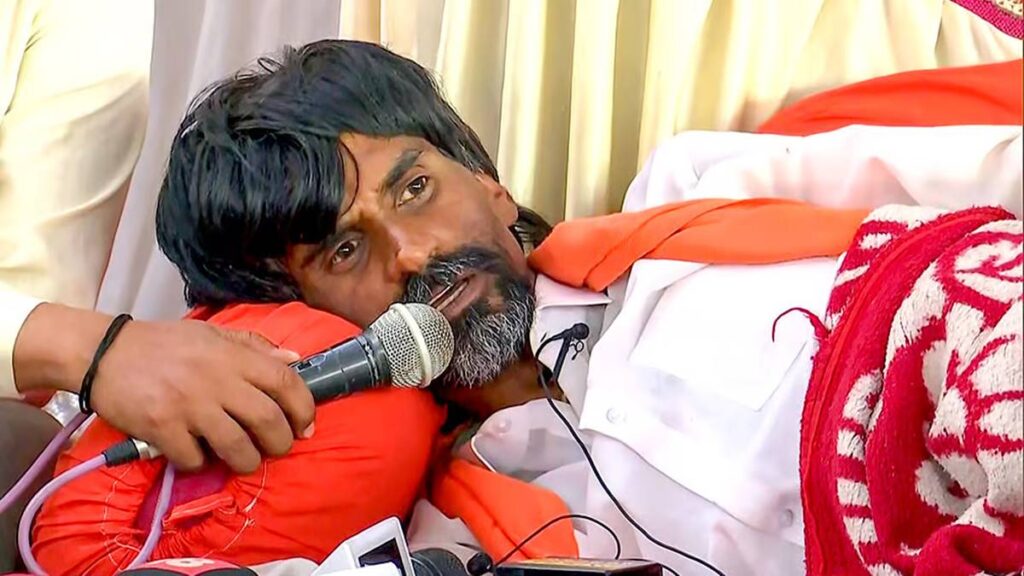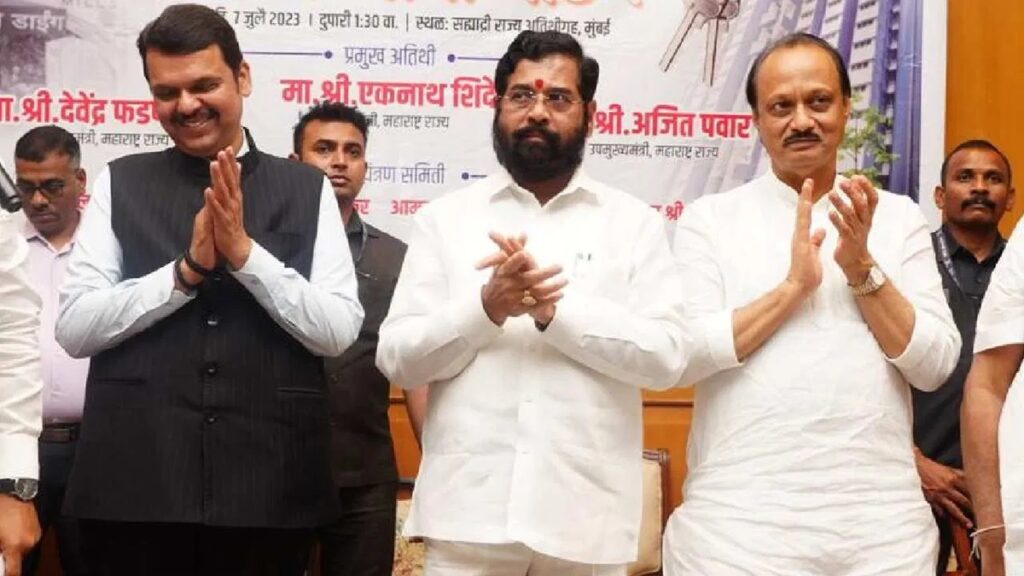X : @vivekbhavsar
The Bharatiya Janata Party on Monday announced the list of its five candidates for the ongoing biennial election to elect members of the Upper House from the assembly member quota. Pankaja Munde is one of them. Pankaja, who hails from the Vanjari-OBC community, lost the recently held Lok Sabha election against Bajrang Sonawane, a Maratha leader. The BJP believes that nominating Pankaja Munde to the Upper House will serve the multiple strategic purposes. Pankaja, who is from the Vanjari-OBC community, the BJP aims to appease and gain support from this community. The move is particularly targeted at the Marathwada region, where there might be unrest or dissatisfaction among OBC voters towards the BJP and It could also strengthen party unity and morale, especially among traditional BJP supporters in the region.
The BJP hopes that by addressing the grievances of the OBC community through Pankaja Munde’s nomination, they can consolidate their voter base and possibly regain the trust of their traditional voters in Marathwada. The Upper House election via the assembly member quota allows parties to strategically place candidates who can influence regional politics and community sentiments. The BJP’s decision to nominate Pankaja Munde for the Upper House seems to be a calculated move to address political challenges in the Marathwada region, particularly concerning the OBC community. It reflects their strategy to regain electoral support and strengthen their position in Maharashtra politics.
The recent electoral setbacks for the BJP in Maharashtra, particularly in the Lok Sabha, have indeed been significant. The BJP’s performance in Maharashtra saw a decline, with the party winning only 9 seats out of 48, down from 24 seats previously. This was viewed as a major setback and humiliation for the BJP and its state leaders, including Devendra Fadnavis.

Pankaja Munde, despite being a prominent leader and daughter of the late Gopinath Munde, faced defeat in the 2024 Lok Sabha election against Bajrang Sonawane, a Maratha leader. In the 2019 state assembly polls, Pankaja Munde lost the Parli seat to her cousin, Dhananjay Munde of the Nationalist Congress Party (NCP), by a significant margin.
There were narratives suggesting internal party dynamics and conflicts, particularly between Devendra Fadnavis and leaders close to the late Gopinath Munde and Nitin Gadkari. Some reports and perceptions indicated that Fadnavis may have deliberately undermined certain party candidates who had ties to Gopinath Munde and Nitin Gadkari, potentially impacting their electoral prospects.
The electoral losses, especially in key constituencies like Parli, have had repercussions for the BJP’s standing and strategy in Maharashtra. Leaders like Pankaja Munde and Prof Ram Shinde, who belong to the OBC community, faced defeat in the assembly elections. This underscores a loss of confidence or support among OBC voters in certain constituencies. Chandrashekhar Bawankule, another prominent OBC leader, was reportedly denied candidacy by the BJP, further exacerbating dissatisfaction within the OBC community. OBC communities have traditionally been a significant support base for the BJP in Maharashtra and other states. Their disillusionment or disappointment could weaken the BJP’s electoral prospects in upcoming elections.
The BJP may need to reassess its approach towards OBC representation and engagement in Maharashtra. Addressing grievances and reinstating confidence among OBC leaders and voters will be crucial for the party’s political strategy in the state. The nomination of Pankaja Munde for the Upper House (Legislative Council) could be seen as a strategic move to rebuild party unity and regain support among certain communities and regions where the BJP’s influence has waned. The electoral setbacks in Maharashtra have reshaped political calculations for the BJP, necessitating strategic decisions such as the nomination of Pankaja Munde to address internal rifts and regain electoral ground in the state.

The dynamics between the OBC and Maratha communities in Maharashtra, particularly concerning reservations and political representation, have indeed played a significant role in recent electoral outcomes and BJP’s setbacks. The demand for reservations for the Maratha and Kunbi communities from the OBC quota has been a contentious issue. Maratha leader Manoj Jarange Patil advocating for such reservations, with backing from ruling Maratha ministers, has intensified tensions. The OBC community perceives this move as a threat to their existing political reservation benefits. There’s a fear that accommodating Marathas and Kunbis within the OBC quota could dilute or reduce opportunities for OBC candidates.
In response to these reservation dynamics, the OBC community’s concerns were reflected in their voting behavior during the Lok Sabha elections. Reports suggest that OBC voters across the state cast their votes against OBC candidates, possibly as a protest or to send a message about their dissatisfaction with how reservation issues were being handled. The BJP, traditionally strong among OBC voters, faced unexpected defeats and setbacks in Maharashtra, Balancing the aspirations and grievances of both OBC and Maratha communities will be crucial for the BJP to regain lost ground and consolidate support ahead of future elections.
It seems the BJP national leadership is aiming to address past errors by promoting leaders from Other Backward Classes (OBC) backgrounds. Pankaja Munde’s candidacy was highlighted, likely to underscore their commitment to OBC leadership within the party. Additionally, the BJP has put forward a diverse array of candidates, which includes Yogesh Tilekar (from the Mali community, which is OBC), Parinay Phuke (from the Kunbi community, also OBC), Amit Gorkhe (from the Scheduled Caste community), and Sadabhau Khot (from the Maratha community). This move appears to be part of a broader strategy by the BJP to broaden its appeal and representation among different social groups, especially focusing on OBC communities.

The hidden message from the list of candidates appears to suggest a strategic move by the BJP to maintain a coalition or alliance with Ajit Pawar’s Nationalist Congress Party (NCP). Pankaja Munde is set to contest in the MLC polls, indicating BJP’s focus on her leadership and the OBC community. Dhananjay Munde of NCP (AP) is the current legislator from the area. This could imply a cooperative stance with NCP in that constituency rather than direct competition.
Yogesh Tilekar is slated for the MLC polls. Chetan Tupe, from NCP (AP), is the sitting MLA in Hadapsar. This situation suggests that Yogesh Tilekar might not have the opportunity to contest the assembly polls directly due to NCP’s presence in the area. Amit Gorkhe is from the SC community and represents Pimpri Chinchwad. Previously, this area was a stronghold of Ajit Pawar. Ashwini Jagtap of BJP currently represents the constituency. The BJP’s choice of candidates for the MLC polls reflects a strategic consideration to possibly maintain a cooperative relationship or alliance with Ajit Pawar’s NCP in these constituencies, rather than engaging in direct electoral competition.
The bienniel election for the 11 posts in the assembly that will be held on July 12. Out of 288 members of the Lower House, 274 will be eligible to cast their votes.



how can i get cheap clomid pill where can i get generic clomiphene without dr prescription get cheap clomiphene pills cost of clomiphene without a prescription cheap clomid for sale how to buy cheap clomiphene no prescription can i buy cheap clomid tablets
This is a keynote which is in to my heart… Diverse thanks! Exactly where can I find the contact details in the course of questions?
This is a keynote which is in to my heart… Many thanks! Faithfully where can I upon the phone details for questions?
zithromax sale – buy ofloxacin 400mg sale buy flagyl sale
semaglutide 14mg ca – generic semaglutide order cyproheptadine 4mg
buy azithromycin online cheap – purchase nebivolol pills nebivolol 5mg without prescription
buy generic clavulanate – atbioinfo cost ampicillin
esomeprazole 20mg tablet – https://anexamate.com/ esomeprazole for sale
mobic 15mg ca – https://moboxsin.com/ meloxicam 7.5mg usa
buy deltasone 10mg generic – https://apreplson.com/ deltasone without prescription
diflucan 200mg oral – buy diflucan 200mg buy diflucan 200mg pills
buy generic cenforce – https://cenforcers.com/ purchase cenforce without prescription
tadalafil liquid review – ciltad generic evolution peptides tadalafil
order ranitidine 150mg for sale – buy cheap zantac order generic zantac
cialis dapoxetine australia – tadalafil liquid fda approval date cialis professional 20 lowest price
More posts like this would bring about the blogosphere more useful. https://gnolvade.com/
viagra jelly for sale – https://strongvpls.com/# cheap viagra london
I’ll certainly carry back to be familiar with more. https://buyfastonl.com/azithromycin.html
More articles like this would make the blogosphere richer. https://ursxdol.com/synthroid-available-online/
The vividness in this ruined is exceptional. https://prohnrg.com/product/rosuvastatin-for-sale/
More articles like this would frame the blogosphere richer. https://aranitidine.com/fr/ivermectine-en-france/
The thoroughness in this draft is noteworthy.
https://doxycyclinege.com/pro/metoclopramide/
This is the type of post I turn up helpful. https://lzdsxxb.com/home.php?mod=space&uid=5065804
forxiga price – forxiga 10 mg pill dapagliflozin 10mg us
cost xenical – this order orlistat online
I couldn’t resist commenting. Well written! http://furiouslyeclectic.com/forum/member.php?action=profile&uid=24899
Thanks for putting this up. It’s well done. kamagra en ligne
Thanks for sharing. It’s acme quality.
Tham gia cộng đồng game thủ tại Go88 để trải nghiệm các trò chơi bài, poker phổ biến nhất hiện nay.
Với giao diện mượt mà và ưu đãi hấp dẫn, MM88 là lựa chọn lý tưởng cho các tín đồ giải trí trực tuyến.
Diversify your leisure with captivating games. In crowns coin casino log in, there’s everything for true gambling fans. Get free spins upon registration!
The candy chaos never stops in Sweet Bonanza — tumble after tumble builds massive win potential. Multipliers sweet bonanza 25000x stack up fast during the bonus round for truly epic payouts. Spin and savor the victory!